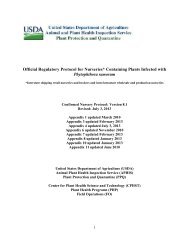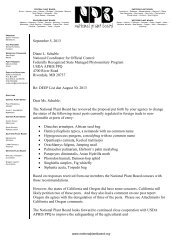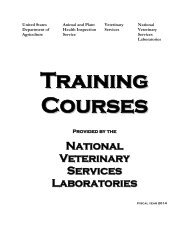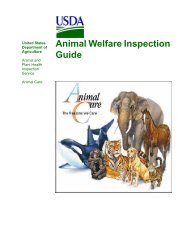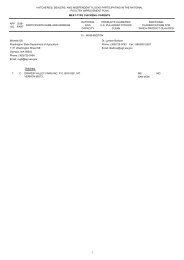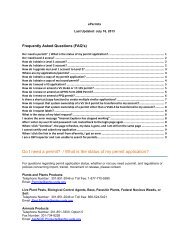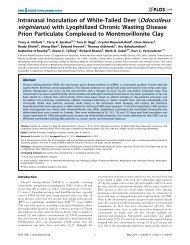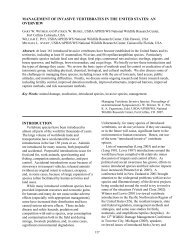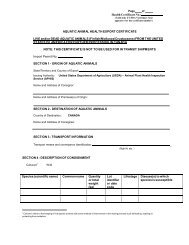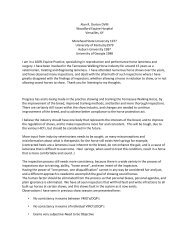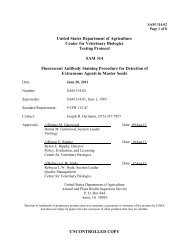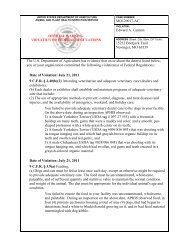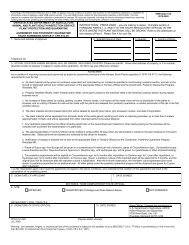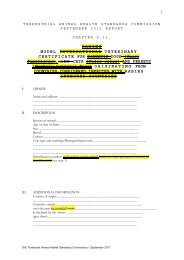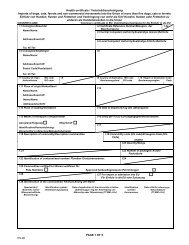New Pest Response Guidelines - aphis - US Department of Agriculture
New Pest Response Guidelines - aphis - US Department of Agriculture
New Pest Response Guidelines - aphis - US Department of Agriculture
Create successful ePaper yourself
Turn your PDF publications into a flip-book with our unique Google optimized e-Paper software.
Taxonomic Support for Surveys<br />
please notify Joel Floyd, the Domestic Diagnostics Coordinator, as to their<br />
availability. Please see the following for some screening aids available: http://<br />
pest.ceris.purdue.edu/caps/screening.php<br />
Other Entities for Taxonomic Assistance in Surveys<br />
When taxonomic support within a state is not adequate for a particular survey,<br />
in some cases other entities may assist including PPQ identifiers, universities<br />
and state departments <strong>of</strong> agriculture in other states, and independent<br />
institutions. Check with the PPQ regional CAPS coordinators about the<br />
availability <strong>of</strong> taxonomic assistance.<br />
Universities and State <strong>Department</strong>s <strong>of</strong> <strong>Agriculture</strong><br />
Depending on the taxonomic group, there are a few cases where these two<br />
entities are interested in receiving samples from other states. Arrangements for<br />
payment, if required for these taxonomic services, can be made through<br />
cooperative agreements. The National Plant Diagnostic Network (NPDN) also<br />
has five hubs that can provide service identifications <strong>of</strong> plant diseases in their<br />
respective regions.<br />
Independent Institutions<br />
The Eastern Region PPQ <strong>of</strong>fice has set up multi-state arrangements for<br />
Carnegie Museum <strong>of</strong> Natural History to identify insects from trap samples.<br />
They prefer to receive unscreened material and work on a fee basis per sample.<br />
PPQ Port Identifiers<br />
There are over 70 identifiers in PPQ that are stationed at ports <strong>of</strong> entry who<br />
primarily identify pests encountered in international commerce including<br />
conveyances, imported cargo, passenger baggage, and propagative material. In<br />
some cases, these identifiers process survey samples generated in PPQ<br />
conducted surveys, and occasionally from CAPS surveys. They can also enter<br />
into our <strong>Pest</strong> ID database the PPQ form 391 for suspect CAPS target or other<br />
suspect new pests, prior to being forwarded for confirmation by an NIS<br />
recognized authority.<br />
PPQ Domestic Identifiers<br />
PPQ also has a limited number <strong>of</strong> domestic identifiers (three entomologists and<br />
two plant pathologists) normally stationed at universities who are primarily<br />
responsible for survey samples. Domestic identifiers can be used to handle<br />
unscreened, or partially screened samples, with prior arrangement through the<br />
PPQ regional survey coordinator. They can also as an intermediary alternative<br />
to sending an unknown suspect to, for example, the ARS Systematic<br />
Entomology Lab (SEL), depending on their specialty and area <strong>of</strong> coverage.<br />
12/2012-01 Dendrolimus Pine Moths D-3



